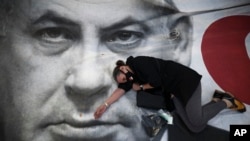After three elections and more than a year, Israel has a new unity government in an emergency power-sharing deal reached this week between Prime Minister Benjamin Netanyahu and his rival, Benny Gantz. But there is concern the new leadership may not be able govern because of internal differences.
The deal came after polls showed Israelis wanted a unity government, a sentiment analysts say largely reflects public worry over the coronavirus emergency.
Before the deal, former army chief of staff Benny Gantz repeatedly said he would never join a government headed by Netanyahu, who is set to go on trial in three separate cases. Gantz then changed his mind.
In remarks on Israeli television, Gantz says that it is more important to fight the coronavirus than to win in politics. He said that he chose to preserve democracy and to join Netanyahu in the emergency situation that Israel is now facing. Israel has kept most of the population home for more than a month and by April 22nd had nearly 200 deaths, with more than 14,000 confirmed cases.
Speaking on the day the deal was reached, political analyst Aviv Bushinsky said Israelis clearly wanted this type of government, especially as the alternative was a fourth election.
"Today a big sign of relief was felt almost in any Israeli home not because it’s the eve of the Holocaust memorial day but because this is a big sign of ending of almost 500 days, 484 days, of political turmoil that included three elections in one year," Bushinsky said. "The deal will have Netanyahu and Gantz rotating as leaders."
Gantz agreed that Netanyahu will be Prime minister for the first year and a half, and will then give the job to him for the next year and a half.
Critics are skeptical that Netanyahu will agree to leave when it is time. Political analyst Yoav Krakovsky says Netanyahu gained more from the deal than Gantz did.
He says Netanyahu’s Likud party comes out stronger as it has a veto over judicial appointments.
The deal comes weeks before Netanyahu is scheduled to go on trial for three separate corruption charges. He has said repeatedly that he believes the Justice system is prejudiced against him.
Critics say they suspect Netanyahu may try to pass legislation that would cancel his trial.
Adding to the chances of deadlock, are the two men’s divergent views on the Israeli-Palestinian conflict.
Netanyahu wants to unilaterally annex Jewish settlements in the West Bank and is free to do it at the beginning of July. Gantz had wanted to delay this initiative and make it contingent on Jordanian approval.
Until just a few months ago, the US position considered Jewish settlements in the West Bank inconsistent with international law.
President Trump reversed that position last year, paving the way for an Israeli annexation of at least part of the area. Palestinians say they will do everything they can to stop the Israeli annexation.






